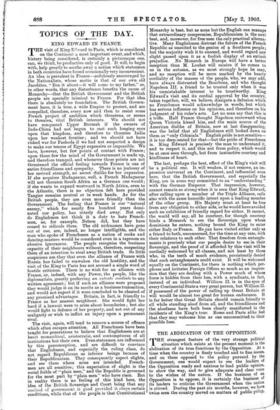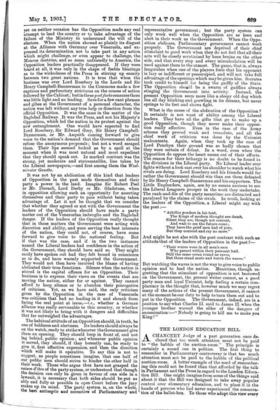THE ABDICATION OF THE OPPOSITION. T HE strangest feature of the
very strange political situation which exists at the present moment is the abdication of its true functions by the Opposition. At a time when the country is finely touched and to fine issues, and on them opposed to the policy pursued by the Government, one would expect to see the leaders of the Opposition ready and anxious to lead public opinion, to show the way, and to give adequate and clear voice to the wishes of the nation. If the business of an Opposition is to oppose, it is certainly the business of its leaders to criticise the Government when the nation is stirred. During the past six months, however, we have twice seen the country moved on matters of public policy, yet on neither occasion has the Opposition made any real attempt to lead the country or to take advantage of the failure of the Ministry to understand the will of the electors. When the nation showed so plainly its disgust at the Alliance with Germany over Venezuela., and ex- pressed its determination not to take part in any action which might challenge, or even appear to challenge, the Monroe doctrine, and so seem unfriendly to America, the Opposition leaders practically disappeared. If they were heard at all, it was only in the shape of feeble bleatings as to the wickedness of the Press in stirring up enmity between two great nations. It is true that when the business was over Lord Rosebery in the Lords and Sir Henry Campbell-Bannerman in the Commons made a few captious and perfunctory strictures on the course of action followed by the Cabinet; but in thesepostfacto censures there was little light and no leading. Save for a few cant phrases and gibes at the Government of a personal character, the nation was left without any true help or direction from the official Opposition. It was the same in the matter of the Baghdad Railway. It was the Press, and not his Majesty's Opposition, which led the nation in its protest against the new entanglement. One would have expected to find Lord Rosebery, Sir Edward Grey, Sir Henry Campbell- Bannerman, or Mr. Asquith coming forward to give voice to the nation's demand that the Government should refuse the anonymous proposals ; but not a word escaped them. Their lips seemed locked as by a spell at the moment when it was most natural and most expedient that they should speak out. In marked contrast was the strong, yet moderate and statesmanlike, line taken by the Liberal newspapers,—and first among them the West- minster Gazette.
It was not by an abdication of this kind that leaders of Opposition in the past made themselves and their party a power in the land. Imagine Sir Robert Peel or Mr. Disraeli, Lord Derby or Mr. Gladstone, when in opposition allowing such an opportunity for asserting themselves and their party to pass without being taken advantage of. Let it not be thought that we consider that whether they agreed or not with the Government the leaders of the Opposition should have made a party matter out of the Venezuelan imbroglio and the Baghdad danger. If the leaders of the Opposition really thought that in those matters the Government were acting with discretion and ability, and Avers serving the best interests of the nation, they could not, of course, have come forward to give voice to the national feeling. But if that was the case, and if in the two instances named the Liberal leaders•had confidence in the action of the Government, they should have said so. They might easily have spoken out had they felt bound in conscience so to do, and have warmly supported the Government. They would not then have incurred the blame of having abdicated their true functions. Silence when the nation is stirred is the capital offence for an Opposition. Their business is to express their views on the events that are moving the nation, either for or against. They cannot afford to keep silence or to abandon their prerogative of criticism. Yet, as we have said, the only criticism given by the Opposition in the case of Venezuela was criticism that had no leading in it and shrank from facing the real point at issue,—i.e., whether a German alliance was really serviceable to this country, or whether it was not likely to bring with it dangers and difficulties that far outweighed the advantages.
The habitual attitude of an Opposition should, in truth, be one of boldness and alertness. Its leaders should always be on the watch, ready to strike whenever the Government give them an opening. They should keep in front of, and not lag behind, public opinion ; and whenever public opinion is moved, they should, if they honestly can, be ready to give it, first effective expression, and then the direction which will make it operative. To say this is not to suggest, as people sometimes imagine, that one half of our public men should strive to hinder the other half in their work. Those who argue thus have not grasped the raison &are of the party system, or understood that though the decision can only be given in favour of one side in a lawsuit, it is necessary that both sides should be put as ably and fully ai possible in open Court before the jury makes up its mind. The party system is, on the whole, the best antiseptic and corrective of Parliamentary and representative government ; but the party system can only work well when the Opposition are as keen and alert in their work as the Government. When the Oppo- sition abdicate, Parliamentary government cannot work properly. The Government are deprived of their chief stimulant to good work when they do not feel that all their acts will be closely scrutinised by keen brains on the other side, and that every step and every miscalculation will be used against them to the utmost. The game, that is, always languishes when one of the players feels that his opponent is lazy or indifferent or preoccupied, and will not take full advantage of the openings which maybe given him. Socrates took credit to himself for being the gadfly of the State. The Opposition should be a swarm of gadflies always stinging the Government into activity. Instead, the present Opposition seem more like a sleepy old dog which lies all day blinking and growling in its dreams, but never springs to its feet and shows fight.
What is the cause of the abdication of the Opposition ? It certainly is not want of ability among the Liberal leaders. They have all the gifts that go to make up a good Opposition, though they never make their opposi- tion really effective. Even in the case of the Army scheme they proved weak and irresolute, and all the chief work of criticism was done by the Unionist malcontents. Again, when they took up the case of Lord Penrhyn their ground was so badly chosen that they were certain of defeat. In a word, even when the Opposition do oppose the heart seems out of their efforts. The reason for their lethargy is no doubt to be found in the divisions in the Liberal party. No Liberal leader ever fights without a look cast over his shoulder to watch what his rivals are doing. Lord Rosebery and his friends would far rather the Government should win than see them defeated by Sir Henry Campbell-Bannerman and his supporters. The Little Englanders, again, are by no means anxious to see the Liberal Leaguers prosper in the work they undertake. The rank-and-file of the party meantime are distracted and paralysed by the claims of the rivals. In truth, looking at the leaders of the Opposition, a Liberal might say with the poet :— " Achilles ponders in his tent,
The Kings of modern thought are dumb, Silent they are, though not content, And wait to see the future come ; They have the grief men had of yore, But they contend and cry no more."
And might he not also with the poet contrast with such an attitude that of the leaders of Opposition in the past?— "Their voices were in all men's ears
Who passed within their puissant hail. Still the same ocean round us raves, But these stand mute and watch the waves."
But watching the waves is not the way to give voice to public opinion and to lead the nation. Meantime, though re- gretting that the stimulant of opposition is not bestowed on the Government, the present writer cannot, as a good party man and loyal Unionist, help feeling a certain com- placency in the thought that, however much we may regret many of the actions of the present Government, it cannot at the moment be our duty to help to turn them out and to put in the Opposition. The Government, indeed, are in a position to say what Charles U. said to James II. when the younger brother warned the elder of the dangers of assassination:—" Nobody is going to kill me to make you King ! "











































 Previous page
Previous page